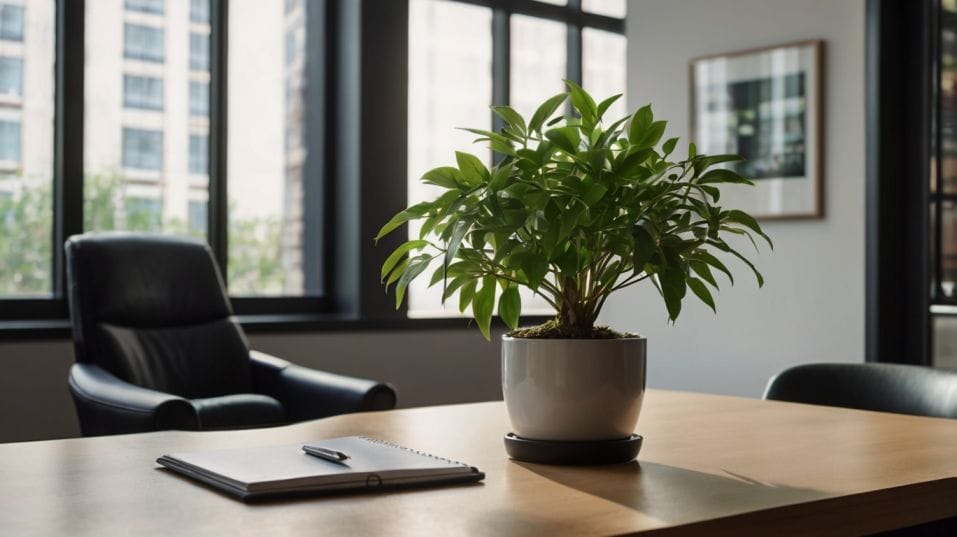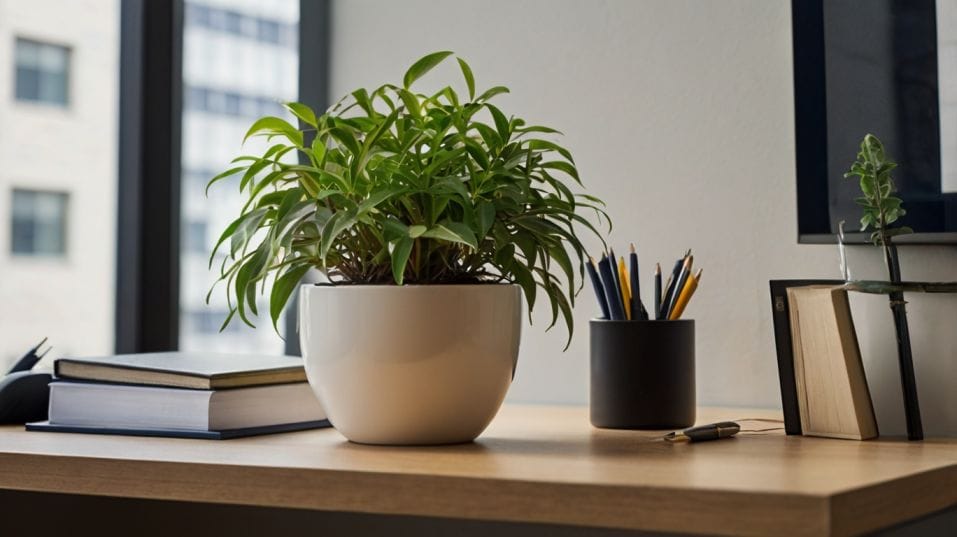How a Simple Desk Plant Can Improve Your Mental Clarity
Discover how a desk plant boosts mental clarity, reduces stress, and enhances focus. Learn which plants are best for a productive workspace.

Does your workspace feel uninspiring or draining? The problem might not be your workload—it could be your environment. A cluttered, lifeless desk can amplify stress, while even a single plant can create a more calming, focused atmosphere.
Studies show that greenery reduces anxiety, sharpens concentration, and enhances problem-solving skills. The best part? It requires almost no effort.
Whether you’re looking to boost energy, improve mental clarity, or just freshen up your space, adding a plant could be the easiest upgrade you make.
The Science Behind Plants and Mental Clarity
Plants do more than add visual appeal. Research shows they reduce cortisol (the stress hormone), improve concentration, and enhance problem-solving abilities.
Even brief interactions with greenery can trigger relaxation responses in the brain, leading to sharper thinking and greater mental resilience.
Beyond cognitive benefits, plants have a profound effect on emotional well-being. Exposure to nature, even in small doses, has been linked to increased feelings of happiness and a sense of calm.
In high-pressure work environments, this natural stress reliever can help counteract mental fatigue and enhance overall job satisfaction.

Additionally, the presence of plants has been shown to increase creativity. Greenery in the workplace can encourage innovative thinking, making problem-solving more fluid and efficient.
Whether you’re brainstorming ideas or tackling complex projects, a more natural setting can help unlock new perspectives.
How Plants Purify the Air and Boost Energy
Indoor air often contains pollutants that contribute to fatigue, headaches, and brain fog. These pollutants come from everyday office materials like furniture, carpets, and electronic devices.
Over time, exposure to stale air can drain energy levels and decrease focus. Plants act as natural air purifiers by absorbing toxins and increasing oxygen levels.
Studies have shown that improved air quality leads to better cognitive function, sustained energy, and fewer distractions throughout the day. Cleaner air means less irritation, fewer sick days, and a workspace that feels fresh and invigorating.
Certain plants, such as peace lilies and bamboo palms, also help regulate humidity. This can be particularly beneficial in air-conditioned offices where dry air can cause discomfort and respiratory issues.
A well-balanced environment leads to greater comfort and sustained focus throughout the day.
Choosing the Right Plant for Your Workspace
Not every plant thrives indoors, but some are ideal for office settings. Hardy, low-maintenance plants that improve air quality and require minimal upkeep make the best choices. Consider the following options:
- Snake Plant: Filters toxins, thrives in low light, and requires little watering. Great for beginners.
- Pothos: Air-purifying with cascading vines that add a calming touch. Adaptable and resilient.
- Aloe Vera: Cleans the air, has soothing properties, and needs very little care. Bonus: Its gel can be used for skin care.
- Peace Lily: Enhances humidity and brings an elegant, peaceful vibe. Effective at removing toxins.
- Spider Plant: Resilient, fast-growing, and a powerhouse air purifier. Safe for pets.
- ZZ Plant: Almost indestructible, tolerates low light, and requires infrequent watering.
- Bamboo Palm: Adds a tropical touch while naturally increasing humidity.
- Rubber Plant: Excellent for removing toxins, adds a bold aesthetic, and thrives with minimal attention.
- Lavender: Known for its calming scent, it can reduce stress while adding a refreshing fragrance to your workspace.
Simple Ways to Incorporate Plants Into Your Workspace
You don’t need a green thumb or a major office overhaul to reap the benefits. Start with a single plant and build from there. Here’s how to make it work effortlessly:
- Find the right spot: Position your plant where it gets enough light, whether near a window or under office lighting. If natural light is limited, choose a low-light plant like the snake plant or ZZ plant.
- Water wisely: Overwatering is the most common mistake—check soil moisture weekly before adding water. Most indoor plants thrive with occasional deep watering rather than frequent small doses.
- Use plants as mindfulness anchors: Taking a few seconds to observe a plant’s leaves, new growth, or movement in the air can serve as a micro-meditation. This simple habit resets focus and reduces stress throughout the workday.
- Rotate plants occasionally: Switching plant locations can refresh your space and prevent stagnation. It also ensures even exposure to light for healthier growth.
- Group plants for added effect: Clustering a few small plants together enhances their air-purifying benefits and creates a natural focal point in your workspace.
- Incorporate plant-based decor: Consider plant-themed artwork, a moss wall, or a mini indoor garden to create an even more engaging environment.
- Use aromatherapy plants: Plants like rosemary, mint, and basil provide fresh scents and can have cognitive-boosting effects, enhancing memory and focus.
Final Thoughts
A desk plant is more than decor—it’s a tool for mental clarity, stress reduction, and increased well-being.
Cleaner air, enhanced focus, and moments of mindfulness can make all the difference in a busy workday. Adding a plant to your workspace is a small effort with a big impact.
Beyond personal benefits, plants also foster a more inviting and collaborative work culture. Offices with greenery tend to have more relaxed and engaged employees, leading to improved teamwork and overall workplace satisfaction.
Start now: Choose a plant that fits your space and lifestyle. Bring nature into your work environment and feel the shift in focus, mood, and overall productivity firsthand.




